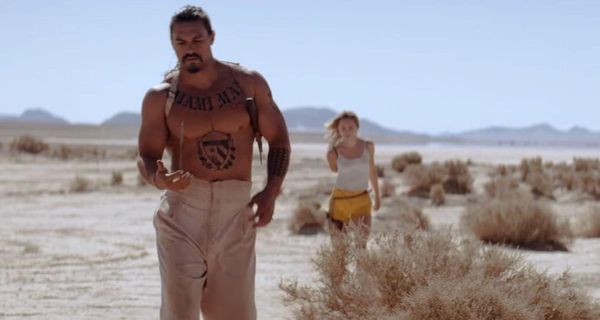Eye For Film >> Movies >> The Bad Batch (2016) Film Review
The Bad Batch
Reviewed by: Jennie Kermode

When Ana Lily Amirpour burst onto the scene in 2014 with the remarkable A Girl Walks Home Alone At Night, it was anyone's guess what she would do next. The similarly genre-defying The Bad Batch has been called a horror film, a comedy, a romance, a political satire and a hopeless mess. It's not for all tastes, but it has something of the same poetry that marked out her debut, and in its transcendent moments reaffirms Amirpour as one of the most extraordinary new filmmakers to emerge in recent years.
We begin with Arlen (Suki Waterhouse), a young woman cast out of a remote, fenced-off United States after one too many black marks have gone down on her permanent record. Though she's a social dropout - part of the 'bad batch' - she still has many values that most viewers will relate to: sympathy, pity for those less fortunate, notions of right and wrong, and an expectation that other people will feel similarly. She's unprepared for the stark brutality of this new world. Within the first 15 minutes of the film she is captured, chained up, and has two limbs sawed off to provide succour for a cannibal tribe. It's only then that we discover what really matters about her - an innate determination to survive that sees her kill one of her captors and use a skateboard to drag herself across miles of desert in search of help.

She finds it in Comfort, a small, walled town presided over by self-proclaimed messiah The Dream (Keanu Reeves), where people treat her kindly and build her an artificial leg. After her recovery, however, she soon becomes restless and ventures back out into the desert. There she seizes an opportunity for revenge, killing a woman she recognises from the cannibal camp, but some impulse makes her spare the woman's child and take her with her back to the town. It is this act on which the rest of the story hinges, as the girl's desperate father, known from his tattoo as Miami Man (Jason Momoa) strives to recover her, and in the process he and Arlen form an unexpected connection.
As with Amirpour's debut, there's a lot going on here, but that in itself seems to be a deliberate choice. The director makes no secret of her intersectional politics and refuses to deliver her work in more studio-friendly style by taking on just one issue at a time. It's life's messiness and complexity that interests her. Arlen finds that she is no more able to assimilate in the bad batch than she was in mainstream society, and an extended semi-hallucinatory sequence sees her seeking out complexity even in the vast blackness of the night sky. In this she has something in common with Miami Man, whom we soon see as more than just a monster, but whose skill as an artist and deep love for his daughter don't hint at any secret softness or desire to be tamed. The film itself is consciously wayward and makes no effort to play for audience sympathy. Cruelty and affection sit side by side. Gradually, Arlen begins to discard her old ideas about morality. If there is a real love story here, its focus is her coming to terms with the world as it is - and not as most people would have it be.
Amirpour's affinity with the western comes through vividly here, the open desert landscapes imbued with a romance and sense of threat rare in modern cinema, whether by night or day. Long, low shots take in the dusty main street of Comfort, promising violence. Everybody is simultaneously scraping a living and at a loose end. The scenes in The Dream's mansion, where everybody wears white, have a lush quality starkly at odds with the roughness of life, visual texture and directorial framing in the alleyways and rubbish dumps surrounding it. Reeves is perfectly cast, far from his usual persona, and Jim Carrey's turn as an addled hermit who probably escapes getting eaten simply because his is so filthy renders the actor almost unrecognisable. Momoa mostly sticks to the brooding he's good at but, in scenes with the child, reveals something entirely beyond what he has achieved as an actor elsewhere. Waterhouse is studiously blank for much of the film, both its protagonist and its mystery, but doesn't struggle to hold the viewer's attention.
Messy as it is, The Bad Batch is bold and beautiful. It's a film made without compromise and guaranteed to stick in the memory.
Reviewed on: 13 Jan 2018















